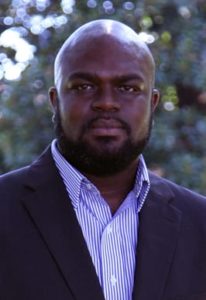![]()
Rev. Lawrence Ware gave the Martin Luther King Jr. Day chapel address, with some help from rapper, Kendrick Lamar.
After introducing the Scriptural passage, Ware said, “I would like to talk to you for the next few moments on this idea: We gon’ be alright. We gon’ be alright. Not ‘we are going to be alright.’” This was a subtle but important change in language.
Ware set the audience at ease by lightening the mood. Ware said, “Ya’ll, I’m a black Baptist preacher. I need to feel comfortable. So I need you to turn to your neighbor, c’mon, turn to your neighbor. Smile at ‘em, show ‘em that sausage biscuit you had for breakfast this mornin’ and say, ‘neighbor, we gon’ be alright.’” The mood was gleeful as hundreds of students, parents and faculty members turned to one another and repeated the phrase, “We gon’ be alright.”
This past year was bloody and divisive. Incidents included the tragedy in Las Vegas, the “Unite the Right” rally in Charlottesville, spray-painted swastikas, DACA protests and rallies. The United States was set on edge. The levity that Ware brought to campus was much needed and much appreciated.
“[Martin Luther] King said, ‘The arc of the universe is long, but it bends towards justice.’ I think he’s right, but I think it bends very slowly.” Ware said after his address.
“The history of this country is a history of progress in a very Hegelian sense. There’s progress, then there’s pushback, and then there’s tension, then you reach a synthesis.” Ware said. He referred to the “dialectical method,” an ancient method of reasoning revitalized in the modern age by German philosopher, Frederic Hegel. The dialect, as Ware explained, is “a thesis, then an antithesis, then a synthesis. So, in a very Hegelian sense, that’s been the sojourn of racial progress in this country. There’s progress, then pushback, then tension, then a new thing that comes out of that.”
“I’m a philosopher and a writer.” Ware said, which explained why he chose to reference Hegel in a dialogue on race. Ware used a verse from Kendrick Lamar’s To Pimp a Butterfly to reassure a mostly white Christian audience of God’s sovereignty. By doing so, Ware illustrated the synthesis of two apparently different worlds into one under God’s authority.
Ware stressed the vital importance of viewing the world through different cultural lenses. “There’s going to have to be a dialogue. Being black in this country, living in this body, you are forced to see things through the lens of what it feels like to be white,” Ware said, “What doesn’t happen, is that many individuals in this country are not forced to look at life through the lens of what it means to be black.”
This is an argument with which history agrees. The United States of America is historically dominated by Anglo-American influences, threads of power that have held through the ages. In order to reach a synthesis, Ware said, white culture must continue to familiarize itself with the cultures surrounding it.
“That’s always happened, but I think it’s happening more now,” Ware said, “You have to listen to and read the work [people of color] are putting out there.” Ware said that, while things appear to be dark and divisive and hopeless, things have been worse, and things will get better. Ware said, “The story of America is the story of people overcoming adversity, and we should not be surprised by what’s happening. One thing I can say with authority is that I’m reminded of Romans 8, that nothing will separate us from the love of God that is in Jesus

